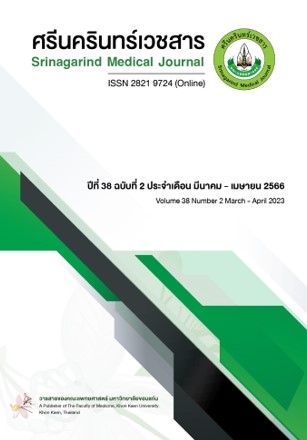Development of a Family Support Model for Families of Adolescence with Illicit Drug Use in the Community
Keywords:
Development of a family support, families, adolescence, illicit drug useAbstract
Background and Objectives: The effects of a family support program on family members of illicit drug users (IDUs) in terms of family members’ health status, quality of life, attitude towards IDUs and family functioning.
Methods: Study participants were 60 family members of IDUs receiving treatment at Huaikoeng Udonthani Hospital. IDUs family members were randomly assigned to either the experimental or comparison group to form a group of 30 participants. Participants engaged into the treatment condition received intervention, whereas people in control trial were treated as usual, using standard care. Participants were assessed at 3 times; baseline, post intervention, and 1 month after intervention completion. Instruments of this study included The M-TFS, GHQ-28 questionnaires, WHOQOL-BREF-THAI, FAS, and FFS. Semi-structure interview was also used. Data analyses were undertaken to obtain frequencies, percentages, means and standard deviations. Chi-square statistics and repeated measures ANOVA were performed for hypotheses testing.
Results: In comparison between the experimental and comarican goups the results showed that 1) mean health status score (CHQ-28) 2) mean quality of life score (WHOGOL-BREF-THAI) 3) mean attitude towords IDU. Score (FAS) and 4 mean family functioning scores (FFS) were all significantly lifferent with the effect sizes of 0.29, 0.29, 0.34 and 0.30, respectively.
Conclusion: The M-TFS was suitable to support family members of substance users. This program should be promoted to health professional
References
Canton H. United Nations Office on Drugs and Crime-UNODC. In the Europa Directory of International Organizations 2021. 2021 Jul 28 (pp. 240-244). Routledge. doi.org/10.4324/9781003179900-33
Addington J, Piskulic D, Devoe DJ, Santesteban-Echarri O, Stowkowy J. Indicated prevention in psychosis risk-psychological approaches. Risk Factors for Psychosis 2020 :351-70. doi.org/10.1016/B978-0-12-813201-2.00018-1
Khamchiangta A, Kavanagh DJ, Shochet. Thai family support (TFS): working with families of young substance users in primary health care. [PhD Thesis]. Queensland University of Technology; 2012.
Velleman R, Arcidiacono C, Procentese F, Copello A, Sarnacchiaro P. A 5-step intervention to help family members in Italy who live with substance misusers. J Mental Health 2008;17(6):643-55.
doi.org/10.1080/09638230701677761
Copello A, Templeton L, Orford J, Velleman R. The 5-Step Method: Evidence of gains for affected family members. Drugs: Education, Prevention & Policy. 2010;17(sup1):100-12. doi.org/10.3109/09687637.2010.514234
Salomonsen-Sautel S, Sakai JT, Thurstone C, Corley R, Hopfer C. Medical marijuana use among adolescents in substance abuse treatment. J Am Acad Child Adolesc Psychiatry 2012;51(7):694-702. doi.org/10.1016/j.jaac.2012.04.004
Viets VL. CRAFT: Helping Latino families concerned about a loved one. Alcoholism Treatment Quarterly. 2007;25(4):111-23. doi.org/10.1300/J020v25n04_08
McCann TV, Polacsek M, Lubman DI. Experiences of family members supporting a relative with substance use problems: a qualitative study. Scand J Caring Sci 2019;33(4):902-11. doi.org/10.1111/scs.12688
Lewis P. Supporting the families of young people with problematic drug use: Investigating support options. 2008.
Copello A, Templeton L, Orford J, Velleman R, Patel A, Moore L, MacLeod J, Godfrey C. The relative efficacy of two levels of a primary care intervention for family members affected by the addiction problem of a close relative: a randomized trial. Addiction. 2009;104(1):49-58. doi.org/10.1111/j.1360-0443.2008.02417.x
Orford J, Natera G, Copello A, Atkinson C, Mora J, Velleman R, et al. Coping with alcohol and drug problems: The experiences of family members in three contrasting cultures. Routledge; 2013 Jan 11. doi.org/10.4324/9780203759608
Orford J, Velleman R, Copello A, Templeton L, Ibanga A. The experiences of affected family members: A summary of two decades of qualitative research. Drugs: Education, Prevention and Policy. 2010;17(sup1):44-62. doi.org/10.3109/09687637.2010.514192
Downloads
Published
How to Cite
Issue
Section
License
Copyright (c) 2023 Srinagarind Medical Journal

This work is licensed under a Creative Commons Attribution-NonCommercial-NoDerivatives 4.0 International License.




